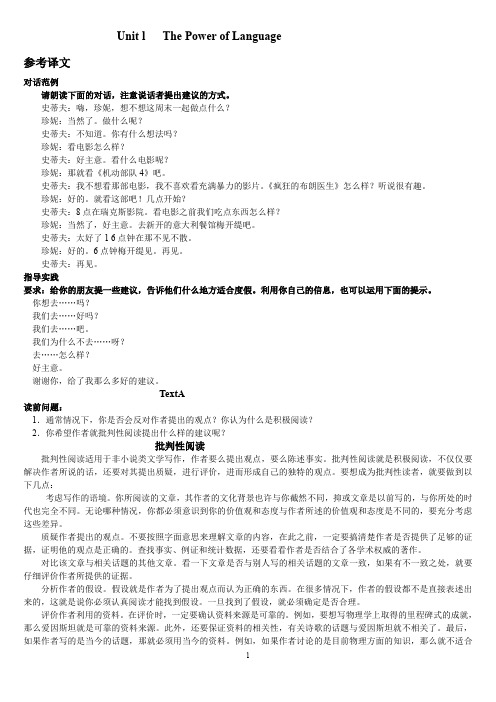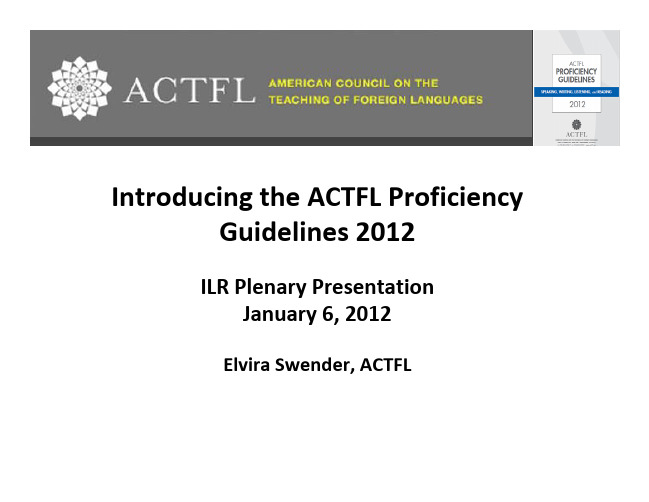Oral Practise Topic for 2012 winter holiday
2012英语四级作文

2012英语四级作文In 2012, I took the CET-4 exam, and it was quite a challenge. The exam was designed to test our English proficiency in various aspects, from reading comprehension to writing skills.For the reading section, the passages were diverse and engaging. Some dealt with scientific advancements, while others focused on cultural differences. I found myself lost in the stories and information, trying to piece together the answers. It was a good reminder that reading is notjust about understanding words, but also about comprehending the overall message and context.The listening part was definitely a test of concentration. The recordings were played at a fast pace, and I had to quickly process the information whilelistening carefully. It was a bit stressful, but it also taught me the importance of active listening in real-life situations.The writing section was my favorite part. I was given a topic and had to write an essay within a limited time. It was exciting to put my thoughts into words and express my opinions. I tried to make my writing clear and concise, while also adding some personal anecdotes to make it more engaging.Overall, the CET-4 exam was a valuable experience. It not only tested my English skills but also helped me identify areas where I needed to improve. I learned that practice and consistency are key to improving my language proficiency, and I'm looking。
2012英语专八作文

2012英语专八作文英文回答:In 2012, I took the English Proficiency Test for Foreign Students (CET-8). It was a challenging experience for me, but I managed to pass it with a high score. Thetest consisted of listening, reading, writing, and speaking sections. For the listening section, I had to listen to various recordings and answer questions based on what I heard. It was quite tricky because the speakers had different accents. However, I practiced a lot by listening to different English podcasts and watching English movies, which really helped me improve my listening skills.For the reading section, I had to read several passages and answer questions about them. One of the passages was about the impact of technology on modern society, and I found it very interesting because it was a topic that I was familiar with. I was able to express my opinions and provide examples from my own life, which I believe helpedme score well on that section.As for the writing section, I had to write an essay on a given topic. I remember the topic was about the importance of learning a second language, and I wrote about my own experience of learning English and how it had broadened my horizons. I also included some idioms and expressions to make my essay more engaging and natural.Overall, taking the CET-8 was a valuable experience for me. It not only tested my English proficiency but also helped me improve my language skills. I believe that with determination and practice, anyone can achieve success in language proficiency tests.中文回答:2012年,我参加了外国留学生英语水平考试(CET-8)。
53高考英语2012版

53高考英语2012版In the 2012 version of the English exam for the National College Entrance Examination (NCEE) in China, also known as the Gaokao, the English test presented a significant challenge to students nationwide. The examination, a crucial component in determining college admissions, assessed students' proficiency in English language skills, including listening, reading, writing, and translation. Let's delve into the key aspects of the 2012 Gaokao English exam and its implications for students.The listening section of the exam comprised multiple-choice questions, wherein students had to carefully listen to recordings and select the correct answers. This section aimed to evaluate students' listening comprehension abilities and their capacity to grasp information accurately in real-time. The topics covered in the listening materials ranged from everyday conversations to academic lectures, requiring students to adapt quickly to diverse contexts.Following the listening section, the reading comprehension segment tested students' ability to understand and analyze written passages. These passages varied in complexity and length, covering topics such as social issues, science, literature, and history. Students were required to comprehend the main ideas, identify supporting details, and infer meaning from the text. Moreover, they had to demonstrate their vocabulary and grammar proficiency to answer questions effectively.The writing section of the exam challenged students to express their ideas coherently and concisely on given topics. This segment assessed their ability to organize thoughts logically, use appropriate vocabulary and grammar structures, and convey arguments persuasively. Students were expected to demonstrate creativity and critical thinking in crafting their responses, whether it was an essay, a letter, or a short composition.Another noteworthy component of the 2012 Gaokao English exam was the translation section, which assessed students' ability to translate between Chinese and English accurately. This task demanded not only a deep understanding of both languages but also proficiency in linguistic nuances and cultural differences. Students had totranslate sentences or paragraphs while preserving the original meaning and adhering to grammatical rules.Overall, the 2012 Gaokao English exam aimed to evaluate students' comprehensive language skills and their ability to communicate effectively in English. Success in the exam required not only mastery of vocabulary and grammar but also the ability to think critically, analyze information, and express ideas fluently. Moreover, the exam underscored the importance of English proficiency in an increasingly globalized world, where effective communication across cultures is essential for academic, professional, and personal success.In conclusion, the 2012 version of the English exam for the National College Entrance Examination in China posed a significant challenge to students, testing their listening, reading, writing, and translation skills. By assessing these key competencies, the exam aimed to gauge students' overall proficiency in English and their readiness for higher education. As English continues to play a vital role in academia and beyond, mastering the language remains a priority for students aspiring to succeed in an increasingly interconnected world.。
英语二自学教程答案主编张敬源【2012年版课后习题答案】

Unit l The Power of Language参考译文对话范例请朗读下面的对话,注意说话者提出建议的方式。
史蒂夫:嗨,珍妮,想不想这周末一起做点什么?珍妮:当然了。
做什么呢?史蒂夫:不知道。
你有什么想法吗?珍妮:看电影怎么样?史蒂夫:好主意。
看什么电影呢?珍妮:那就看《机动部队4》吧。
史蒂夫:我不想看那部电影,我不喜欢看充满暴力的影片。
《疯狂的布朗医生》怎么样?听说很有趣。
珍妮:好的。
就看这部吧!几点开始?史蒂夫:8点在瑞克斯影院。
看电影之前我们吃点东西怎么样?珍妮:当然了,好主意。
去新开的意大利餐馆梅开缇吧。
史蒂夫:太好了1 6点钟在那不见不散。
珍妮:好的。
6点钟梅开缇见。
再见。
史蒂夫:再见。
指导实践要求:给你的朋友提一些建议,告诉他们什么地方适合度假。
利用你自己的信息,也可以运用下面的提示。
你想去……吗?我们去……好吗?我们去……吧。
我们为什么不去……呀?去……怎么样?好主意。
谢谢你,给了我那么多好的建议。
TextA读前问题:1.通常情况下,你是否会反对作者提出的观点?你认为什么是积极阅读?2.你希望作者就批判性阅读提出什么样的建议呢?批判性阅读批判性阅读适用于非小说类文学写作,作者要么提出观点,要么陈述事实。
批判性阅读就是积极阅读,不仅仅要解决作者所说的话,还要对其提出质疑,进行评价,进而形成自己的独特的观点。
要想成为批判性读者,就要做到以下几点:考虑写作的语境。
你所阅读的文章,其作者的文化背景也许与你截然不同,抑或文章是以前写的,与你所处的时代也完全不同。
无论哪种情况,你都必须意识到你的价值观和态度与作者所述的价值观和态度是不同的,要充分考虑这些差异。
质疑作者提出的观点。
不要按照字面意思来理解文章的内容,在此之前,一定要搞清楚作者是否提供了足够的证据,证明他的观点是正确的。
查找事实、例证和统计数据,还要看看作者是否结合了各学术权威的著作。
对比该文章与相关话题的其他文章。
看一下文章是否与别人写的相关话题的文章一致,如果有不一致之处,就要仔细评价作者所提供的证据。
2012年精选试题d套英语听说

2012年精选试题d套英语听说In 2012, English listening and speaking skills were considered crucial in various academic and professional settings. As a result, a set of carefully selected questions was designed to test individuals' proficiency in these areas. In this article, we will delve into the specifics of the 2012 selected questions set D, focusing on the listening and speaking components.Listening skills play a vital role in effective communication, and the 2012 selected questions set D aimed to evaluate individuals' ability to comprehend and interpret spoken English. The questions were designed to test various aspects, including understanding main ideas, specific details, and inference skills. Each question was carefully crafted to challenge the participants and assess their listening proficiency accurately.One of the listening questions in set D focused on understanding main ideas. Participants were required to listen to a short conversation or a passage and identify the main topic or purpose of the speech. This question aimed to assess the individuals' ability to grasp the central theme of a conversation or presentation, highlighting their comprehension skills.Another listening question in the set aimed to evaluate the participants' ability to comprehend specific details. They were required to listen to a conversation or a passage and answer a series of questions based on the information provided. This question aimed to test the individuals' attention to detail and their ability to extract specific information from a spoken text accurately.In addition to assessing listening skills, the 2012 selected questions set D also emphasized the importance of speaking proficiency. Speaking skills are crucial in effective communication, and the questions were designed to evaluate individuals' ability to express themselves clearly and coherently in spoken English.One of the speaking questions in the set focused on giving a personal opinion. Participants were asked to express their thoughts on a particular topic, providing reasonsand examples to support their viewpoint. This question aimed to assess the individuals' ability to present their ideas in a logical and persuasive manner, showcasing their speaking proficiency.Another speaking question in the set aimed to evaluate the participants' ability to describe a process or procedure. They were given a task or a situation and asked to explain the steps involved in completing it. This question aimed to test the individuals' ability to organize information and explain it clearly, demonstrating their speaking skills effectively.Overall, the 2012 selected questions set D for English listening and speaking provided a comprehensive assessment of individuals' language proficiency in these areas. By testing various aspects, including understanding main ideas, specific details, expressing opinions, and describing processes, the set aimed to provide an accurate evaluation of individuals' listening and speaking abilities.It is important to note that developing and enhancing listening and speaking skills require consistent practice and exposure to spoken English. Individuals can improve their listening skills by regularly listening to English audio materials, such as podcasts, news broadcasts, and movies. Engaging in conversations and discussions with native English speakers or fellow language learners can also significantly improve speaking skills.In conclusion, the 2012 selected questions set D for English listening and speaking aimed to assess individuals' proficiency in these areas accurately. By testing various aspects, the set provided a comprehensive evaluation of individuals' listening and speaking skills. Developing and enhancing these skills require consistent practice and exposure to spoken English, and individuals can take proactive steps to improve their proficiency in these areas.。
ACTFL Guidelines 2012 ILR Presentation 1.6

© 2012 American Council on the Teaching of Foreign Languages
About the ACTFL Proficiency Guidelines
They are a global characterizations of integrated performance in each of four language skills: Speaking Writing Reading Listening
1986 Publication
Derived from the Interagency Language Roundtable (ILR) Language Skill Descriptions
Long government tradition of use Since 1948
© 2012 American Council on the Teaching of Foreign Languages
What users of a language can and cannot do
The ACTFL Proficiency Guidelines Provide
Articulation across instructional levels and across languages
© 2012 American Council on the Teaching of Foreign Languages
History of ACTFL Proficiency Guidelines
© 2012 American Council on the Teaching of Foreign Languages
2012年英语四级作文题目

2012年英语四级作文题目Nowadays, the integration of technology in the educational system has become a topic of significant interest and debate. As an English teacher, I would like to share my perspective on how technology has reshaped the way we teach and learn English, especially in the context of the English Level Four proficiency.Firstly, the advent of digital platforms has made it possible for students to access a wealth of learning resources attheir fingertips. Online dictionaries, grammar guides, and interactive language courses have become invaluable tools for enhancing language skills. For instance, students can now use applications to practice their listening comprehension with native speakers from around the world, which was not aseasily accessible in the past.Secondly, the use of multimedia in the classroom has made learning more engaging and interactive. Videos, podcasts, and educational software can cater to different learning styles, making the learning process more inclusive and effective. For example, through video analysis, students can better understand the nuances of spoken English, including idiomatic expressions and cultural references.Moreover, technology has facilitated personalized learning. With the help of educational apps and online platforms, students can now learn at their own pace, focusing on areaswhere they need improvement. This individualized approach to learning can lead to better retention and a deeper understanding of the language.However, it is important to acknowledge the challenges that come with the use of technology in education. One of the primary concerns is the potential for distraction, as students might be tempted to use their devices for non-educational purposes. Additionally, not all students have equal access to technological resources, which can lead to disparities in learning opportunities.In conclusion, while technology has brought about numerous benefits to English education, it is crucial for educators to use it responsibly and thoughtfully. By doing so, we can ensure that technology serves as a tool for enhancing learning rather than a distraction from it. As we continue to navigate the digital age, it is our responsibility to harness the power of technology to create a more dynamic andeffective learning environment for our students.。
英语练习题第三版PPT课件

目录
contents
Overview of exercise questions Listening exercises Reading comprehension exercises Writing Practice Vocabulary and grammar exercises
Organizational Structure Questions
Questions that ask about the organizational structure or sequence of events in a listening passage
Answers and Analysis of Listening Practice
Predicting Information
The ability to predict information based on context includes and previous knowledge This helps in making informed guides about updating information and reducing anxiety during listening tasks
Skills for Listening Practice
Questions for listening exercises
Main Idea Questions
Questions that ask about the overall topic or main idea of a listening passage
Detail Oriented Questions
